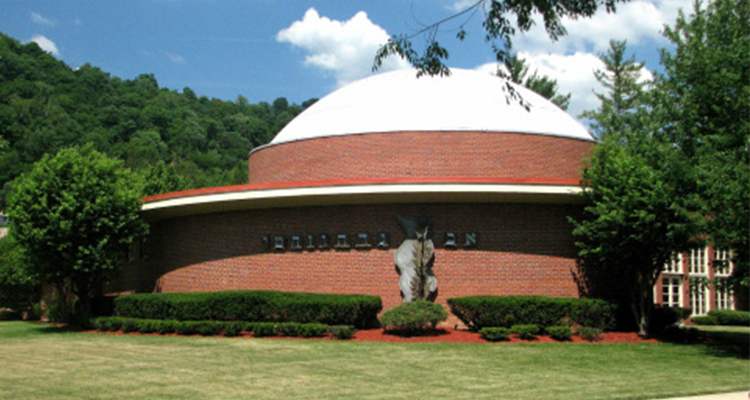A sure sign of their growth and stability in the area came in the 1849 formation of the first Jewish congregation founded in Wheeling, in what would later become West Virginia. Although it has gone through many changes, the congregation remains strong, and 170 years later, members gather at Temple Shalom on Bethany Pike in the quiet neighborhood of Woodsdale.
This weekend, they will celebrate the milestone.
L’SHEM SHOMAYIM
Congregation L’Shem Shomayim (Hebrew, meaning “For the sake of Heaven”) was founded by 15 mostly German Jewish families who had settled in Wheeling, Virginia. Among many of those first Jewish families are names well known to this day in Wheeling: Aub, Ballenberg, Bloch, Heyman, Horkheimer, Moss, Rheinstrom and Sonneborn.
Not long after L’Shem Shomayim was formed, Mayer Mannheim, a traveling rabbi, arrived in Wheeling, performed Sabbath services and then died suddenly. Given this unexpected turn of events, the first major act of the new congregation was to create the first Jewish cemetery in Wheeling. They collected the funds necessary, purchased a part of Mt. Wood Cemetery on Wheeling Hill and interred Rabbi Mannheim. To this day, Temple Shalom maintains this portion, often referred to as the Jewish section of the cemetery, while the City of Wheeling owns and cares for the rest of the vast property.
Prior to Rabbi Mannheim’s internment, the land was the site of family burials. Following the lead across the country for planned rural romantic cemeteries outside of churchyards and city boundaries, Mt. Wood became a ceremonial spot for family picnics and other occasions for memorializing the dead. It earned a spot on the National Registry for Historic Places in 2013.
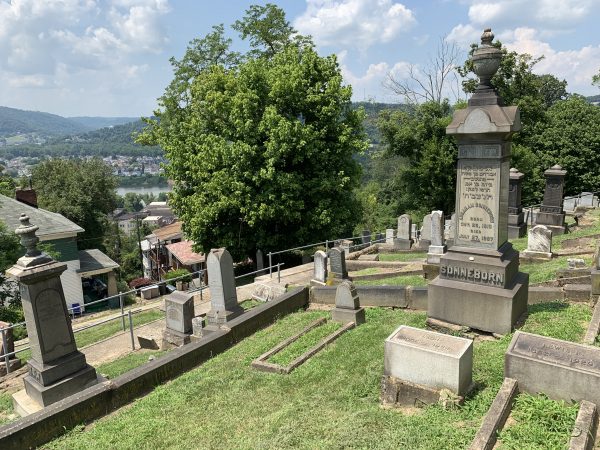
From 1849-56 a small community of Jews held services during the Holy Days in a small room on the third floor of a house at 14th and Main Streets using traveling rabbis to fulfill their leadership needs. In 1856, Wheeling obtained the services of its first permanent rabbi, Rabbi Fault.
Around this time, L’Shem Shomayim member Augustus Pollack established a notions and fancy goods business in Wheeling. Later, he would become known as the Stogie King when his Crown Stogies enterprise became the largest cigar manufacturer in West Virginia, and his factory became one of the largest tobacco factories in the world.
Although Pollack contributed greatly to German life in the city by organizing a civilian corps of American Germans during the Civil War, starting a German-language newspaper and leading Saengerfest (a major German singing festival), he became known worldwide for his fair labor practices. He never expected his workers to work harder than he did, he paid fair wages, and he valued workplace safety. In fact, he was so beloved for his treatment of his workers that, when he died in 1906, more than 10,000 people attended his funeral procession, and the Garfield Assembly of International Stogie Makers collected donations from unions around the globe to construct a monument in Pollack’s memory.
Today, that monument, which depicts a handshake between employer and employee, stands at Wheeling Heritage Port. The inscription reads: “Erected by Trade Union Members of United States in Memory of Augustus Pollack Whose Business Life and Actions Were Always in Sympathy with Organized Labor.”
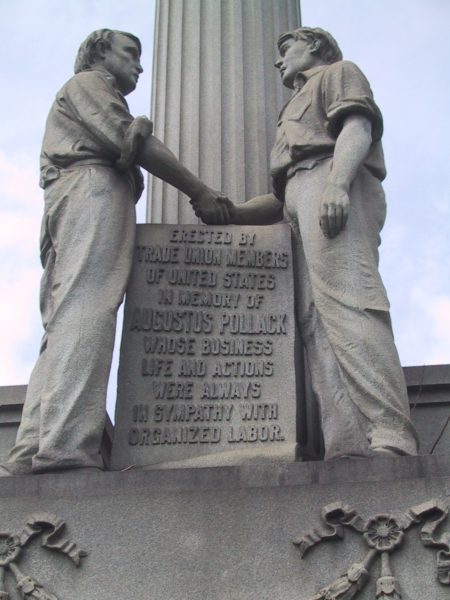
While Pollack was busy building his empire and serving his community, his congregation was also growing. After moving from building to building and home to home for nearly half a century, L’Shem Shomayim found its first permanent home — a temple built on Eoff Street in 1892. The congregation found itself part of an ever-expanding tradition of Reform Judaism in America, which re-examined Jewish traditions in favor of more progressive practices, such as easing restrictive dietary laws, saying prayers in languages other than Hebrew and no longer wearing special outfits that identified them as Jews.
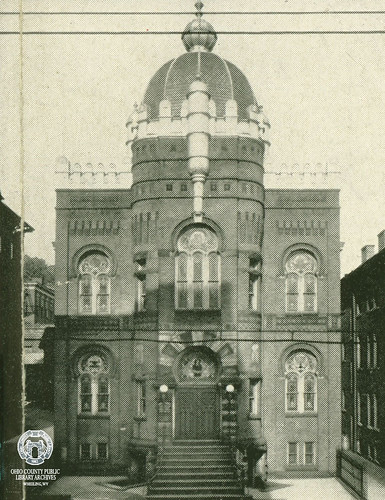
In the 1850s, Rabbi Isaac Mayer Wise, the leader of Reform Judaism in America, visited the Wheeling community by steamboat and included notes from his visit in his book, Reminiscences. In his speech to the Wheeling Jewish community, he admonished people for being cruel to immigrants, which as he says, “attracted the notice of some countrymen of mine, who treated my wife and myself most amiably.”
Another wave of Jewish immigration began in 1880 and ended in 1924, when immigration laws placed limits on immigrants coming into the U.S. That period saw incredible growth in Jewish communities across the country. Most of this wave of Jews originated in Eastern European countries, including L’Shem Shomayim’s rabbi, Abba Hillel Silver. Wheeling was Silver’s first job as rabbi after graduating valedictorian of his Hebrew Union College (Cincinnati) class and ordination in 1915. From here, he moved on to become the rabbi of large and growing Temple-Tifereth Israel in Cleveland, Ohio, where he served for 46 years.
Silver was well known for supporting labor unions and the rights of workers. He was also internationally known for his support of Zionism, or the belief that Jewish people are entitled to their own homeland. This nationalist movement was responsible for the creation of the State of Israel.
Meanwhile, American Jews realized that they were losing touch with their history. Thankfully, a Wheeling boy turned rabbi, Jacob Rader Marcus, spent his life researching and preserving the history of Judaism in America and is known as the father of American Jewish historical research. At one time confirmed at Wheeling’s Eoff Street Temple, Rabbi Marcus later founded the American Jewish Archives in Cincinnati, where he lived and worked until his death in 1995 at age 99.
The influx of Jews into the U.S. from 1880-1924 meant an expansion of Jewish congregations across the country. In fact, Wheeling’s Jewish population had increased enough to support more than one congregation and a move from the recently burned Eoff Street Temple to a newly built temple in Wheeling’s Woodsdale neighborhood in 1958. Its new synagogue, a single-story building called Woodsdale Temple, was constructed on Bethany Pike.
When the Jewish population in Wheeling began to fall in 1970, L’Shem Shomayim refused to give up. Instead, the reformed Woodsdale Temple merged with the Conservative Synagogue of Israel on nearby Edgington Lane (now Gompers Lohri & Associates). The new congregation was housed in the Woodsdale Temple building and became known fittingly as Temple Shalom, which means “peace.”
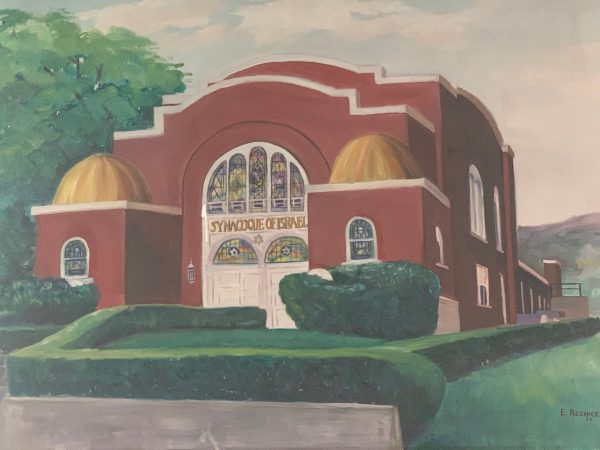
TEMPLE SHALOM STILL LIGHTS THE WAY
Today, Temple Shalom is home to approximately 75 families, and its members reach out to Greater Wheeling community and beyond. Every spring for the past 30 years, Temple Shalom has opened its doors for the Chocolate Extravaganza. Vendors from throughout the Ohio Valley serve up decadent chocolate treats for patrons whose ticket fees help Temple Shalom’s community outreach and youth programs.
But the work of the Temple is not all fun and games. The day after a gunman shot and killed 11 Jews attending services at the Tree of Life Synagogue in Pittsburgh, Pennsylvania, Temple Shalom’s rabbi, Joshua Lief, gathered religious leaders from around the area to hold an interfaith service. Open to the entire community, Lief encouraged persons grieving the loss of life to join together in prayer. And the community responded to his call. There was standing room only on that day in late October 2018.
Rabbi Lief was not surprised by the outpouring, however. He knows the Wheeling community well. Lief grew up in Wheeling and recently returned to the area to serve as Temple Shalom’s rabbi. He is proud of his congregation and the Woodsdale neighborhood where he and his wife are raising their children. He is one of just a few rabbis in the country to be able to serve his childhood community.
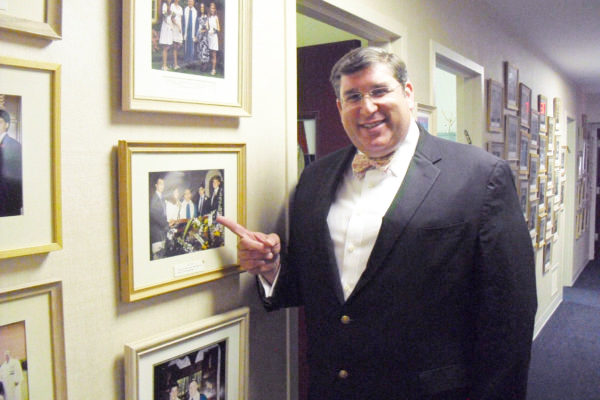
And service to the community remains a cornerstone for Wheeling Jews just as it was from the beginning when congregation members served the Ohio Valley through generous philanthropic gifts. As Rabbi Lief says, “their legacy endures to this day” in the familiar names such as Bloch, Strauss, Levinson, Horne, Kaufman and Posin. He acknowledges that although Jews were not part of the original founding of Wheeling 250 years ago, they “cared deeply about the betterment of the city and to live their lives.”
Although Temple Shalom houses a relatively small congregation, Rabbi Lief notes that “even though we are very small, we have had and continue to have a big impact on the community when we work together with our neighbors.” Temple Shalom continues to work with Catholic Charities and other organizations in service to the community.
In addition, Rabbi Lief is proud that his congregation is part of the current Wheeling Renaissance, which includes Jewish-owned business like Ziegenfelder’s. Much like Pollack in the late 19th century, Lisa Allen, president and CEO of the Wheeling-based frozen treat company, values her employees. The company is known for hiring people with a history of drug addiction who are trying to remain in recovery, a risk that many other businesses are unwilling to take. Rabbi Lief says that this commitment to workers is all based on 400 Jewish values that speak to the importance of compassion and fairness for all workers.


